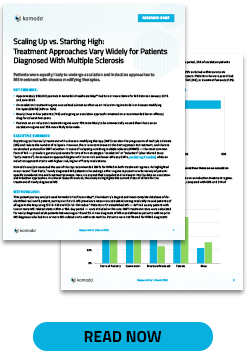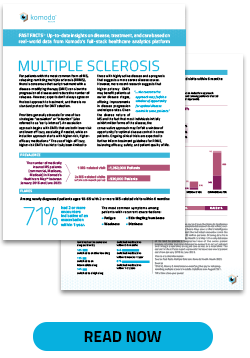New Research Brief and Fast Facts Examine DMT Approaches for Patients With Multiple Sclerosis
.png)
 Before 2017, the number of patients in the U.S. living with multiple sclerosis (MS) was estimated to be between 300,000 and 400,000. However, recent research funded by the National MS Society has more than doubled that estimation to just over 900,000. For this growing number of patients, finding the best treatment approach can be a challenge. Multiple sclerosis predominantly affects women, who make up about 74% of diagnosed cases in the U.S. Most often diagnosed between the ages of 20 and 40, MS can show up and progress very differently in each patient. For relapsing-remitting multiple sclerosis (RRMS), the most common form of the disease, there is no standard treatment protocol.
Before 2017, the number of patients in the U.S. living with multiple sclerosis (MS) was estimated to be between 300,000 and 400,000. However, recent research funded by the National MS Society has more than doubled that estimation to just over 900,000. For this growing number of patients, finding the best treatment approach can be a challenge. Multiple sclerosis predominantly affects women, who make up about 74% of diagnosed cases in the U.S. Most often diagnosed between the ages of 20 and 40, MS can show up and progress very differently in each patient. For relapsing-remitting multiple sclerosis (RRMS), the most common form of the disease, there is no standard treatment protocol.
Two distinct treatment strategies for the delivery of disease modifying therapies (DMT) in newly diagnosed MS patients are “escalation” and “induction” (also called “early-intense”). An escalation approach starts with lower-risk, lower-efficacy medications that can be escalated if needed, while an induction approach starts with higher-risk, higher-efficacy medications.
 In our most recent research brief and “Fast Facts,” we leveraged our new MapLab™ solution to shine a light on these two treatment strategies for RRMS. We investigated the commonality of each approach with the top-recommended drugs, as well as the payer breakdowns, to gain a better understanding of current patient journeys.
In our most recent research brief and “Fast Facts,” we leveraged our new MapLab™ solution to shine a light on these two treatment strategies for RRMS. We investigated the commonality of each approach with the top-recommended drugs, as well as the payer breakdowns, to gain a better understanding of current patient journeys.
We found that, among adult patients treated with either of the two treatment approaches, the escalation approach was utilized almost as often as the induction approach. We also found that, among patients undergoing an escalation approach, 74% remained on a recommended lower-efficacy drug for at least two years. Looking at demographic differences in treatment approaches, patients on an induction treatment regime were 15% more likely to be commercially insured than those on an escalation regime and 35% more likely to be male.
As ongoing clinical trials evaluate the impacts of both treatment approaches on patient outcomes, this analysis offers Life Sciences teams and advocacy groups key insights and a more complete view of the treatment journeys navigated by MS patients.
Read our MS research brief here.
Read our MS Fast Facts here.
 about how novel applications of AI can uncover new findings for MS patients and their providers.
about how novel applications of AI can uncover new findings for MS patients and their providers.
To see more articles like this, follow Komodo Health on X, LinkedIn, or YouTube, and visit Insights on our website.

.png?width=984&height=520&name=blog05%20blank%20(1).png)





